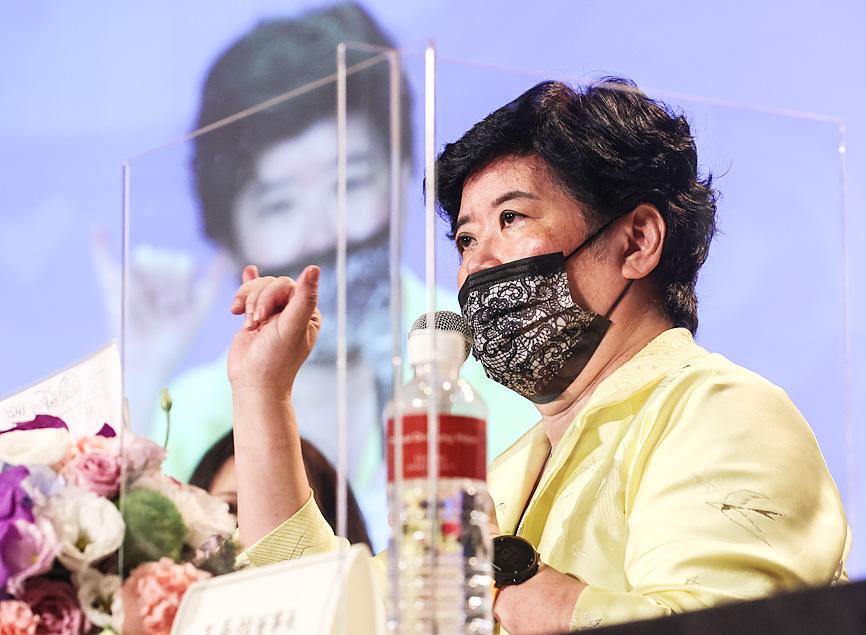United Biomedical Inc Asia (聯亞生技) on Sunday urged the government to give its COVID-19 vaccine candidate, UB-612, a second chance, after its application for emergency use authorization (EUA) was denied last week.
Company founder Wang Chang-yi (王長怡) said that the Food and Drug Administration’s (FDA) standards for granting an EUA were hastily devised and outdated.
In assessing the effectiveness of a vaccine candidate, the FDA only considers the virus neutralizing antibodies — expressed as geometric mean titers (GMTs) — but the reaction of T-cells should also be part of the equation, Wang said.

Photo: CNA
The FDA should compare the effectiveness of the UB-612 vaccine and the AstraZeneca vaccine against the Delta variant of SARS-CoV-2, given that the variant is the most contagious, she said.
“It would be deeply regrettable to deny people access to such a good vaccine because of hastily devised EUA standards,” Wang said.
Despite the setback, the firm remains committed to seeking international approval for its COVID-19 vaccine candidate, she said.
United Biomedical said that it would soon appeal the FDA’s decision not to grant an EUA for the UB-612 vaccine.
The FDA respects the company’s right to appeal, it said, adding that it would review the application and decide whether another meeting of experts would be necessary.
On Monday last week, the FDA said that a majority of the experts had on Sunday voted not to grant the company an EUA.
To be granted an EUA, a vaccine must have a seroconversion rate of more than 50 percent, with GMTs at least equal to two-thirds of the level found in recipients of the AstraZeneca vaccine.
The FDA decided to test the antibody concentrations against people who had been inoculated with the AstraZeneca vaccine, because there is no globally recognized method for measuring GMTs or an accepted standard for what GMT level indicates effective protection.
The interim results of the company’s phase 2 clinical trials, released in late June, show that participants in the 19 to 64 age group had a seroconversion rate of 95.65 percent, meaning that 95.65 percent of participants produced neutralizing antibodies.
At the time, the company said that the GMT level was 102.3, while the GMT level of the AstraZeneca vaccine was 187.9, according to the FDA.
The comany had said that it would continue its phase 2 clinical trials in Taiwan and that its parent company, United Biomedical Inc, would re-evaluate the benefits of conducting phase 3 clinical trials.
At Sunday’s news conference, Wang did not say whether the company was proceeding with its plan to begin phase 2/3 efficacy trials in India, which were expected to have 11,000 participants.
The company would conduct phase 3 clinical trials in India for its “next-generation” COVID-19 vaccine, named “UB-613,” she said, without elaborating.

South Korea’s equity benchmark yesterday crossed a new milestone just a month after surpassing the once-unthinkable 5,000 mark as surging global memory demand powers the country’s biggest chipmakers. The KOSPI advanced as much as 2.6 percent to a record 6,123, with Samsung Electronics Co and SK Hynix Inc each gaining more than 2 percent. With the benchmark now up 45 percent this year, South Korea’s stock market capitalization has also moved past France’s, following last month’s overtaking of Germany’s. Long overlooked by foreign funds, despite being undervalued, South Korean stocks have now emerged as clear winners in the global market. The so-called “artificial intelligence

‘SEISMIC SHIFT’: The researcher forecast there would be about 1.1 billion mobile shipments this year, down from 1.26 billion the prior year and erasing years of gains The global smartphone market is expected to contract 12.9 percent this year due to the unprecedented memorychip shortage, marking “a crisis like no other,” researcher International Data Corp (IDC) said. The new forecast, a dramatic revision down from earlier estimates, gives the latest accounting of the ongoing memory crunch that is affecting every corner of the electronics industry. The demand for advanced memory to power artificial intelligence (AI) tasks has drained global supply until well into next year and jeopardizes the business model of many smartphone makers. IDC forecast about 1.1 billion mobile shipments this year, down from 1.26 billion the prior

People stand in a Pokemon store in Tokyo on Thursday. One of the world highest-grossing franchises is celebrated its 30th anniversary yesterday.

NEW IDENTITY: Known for its software, India has expanded into hardware, with its semiconductor industry growing from US$38bn in 2023 to US$45bn to US$50bn India on Saturday inaugurated its first semiconductor assembly and test facility, a milestone in the government’s push to reduce dependence on foreign chipmakers and stake a claim in a sector dominated by China. Indian Prime Minister Narendra Modi opened US firm Micron Technology Inc’s semiconductor assembly, test and packaging unit in his home state of Gujarat, hailing the “dawn of a new era” for India’s technology ambitions. “When young Indians look back in the future, they will see this decade as the turning point in our tech future,” Modi told the event, which was broadcast on his YouTube channel. The plant would convert